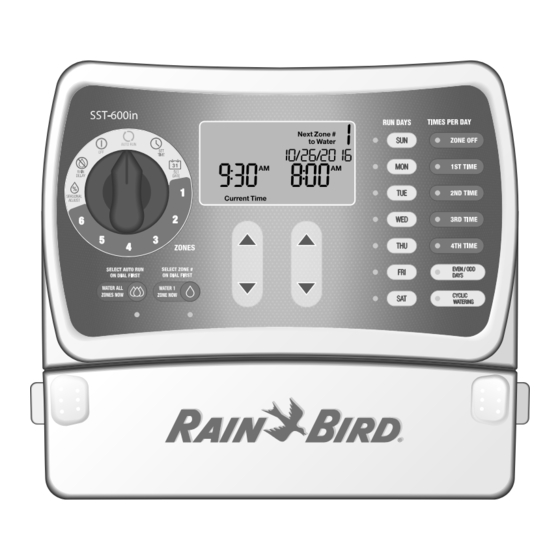Setting up your Rainbird sprinkler system might seem tricky at first, but it doesn’t have to be. Imagine having a lush, green lawn that waters itself exactly when it needs to.
You’re just a few simple steps away from making that happen. In this guide, you’ll learn how to set your Rainbird sprinkler system quickly and easily, so you can save time, water wisely, and enjoy a healthier yard. Ready to take control of your watering schedule and see real results?
Keep reading—your perfect lawn is closer than you think.
Choosing The Right Rainbird Sprinkler
Choosing the right Rainbird sprinkler depends on your yard size and shape. Smaller yards need compact sprinklersthat cover less area. Large yards benefit from rotary sprinklersthat spray water in circles. Consider the water pressurein your home; low pressure needs sprinklers designed for that. Also, check the sprinkler head typefor the plants you want to water. Some heads work best for flower beds, others for lawns.
- Check yard layout before buying
- Match sprinkler type to plant needs
- Choose heads that cover your watering zones
- Consider water pressure to avoid weak spray

Credit: www.manualslib.com
Planning Your Sprinkler Layout
Start by measuring your lawn area carefully. Draw a simple map of your yard. Mark any obstacles like trees, walkways, or flower beds. Decide where the water source is located. Plan zones based on water pressure and coverage needs. Each zone should cover a similar area for even watering.
Choose sprinkler heads that fit your lawn shape. Use rotating heads for large areas. Fixed spray heads work well for small, narrow spots. Space sprinklers so their spray overlaps. This ensures no dry patches.
| Sprinkler Type | Best For | Spacing |
|---|---|---|
| Rotating | Large, open areas | 15-30 feet apart |
| Fixed Spray | Small, narrow areas | 6-15 feet apart |
- Keep sprinklers away from sidewalks and driveways.
- Group plants with similar water needs together.
- Check local water rules before planning.
Installing The Sprinkler System
Start by turning off the main water supply to avoid leaks. Locate the best spots for sprinkler heads to cover the lawn evenly. Dig small trenches for pipes, making sure they are deep enough to avoid damage.
Connect the pipes to the water source and attach sprinkler heads. Use Teflon tape on threaded connections to prevent leaks. Check the system pressure and adjust sprinkler heads for proper spray patterns.
- Check local codes before digging.
- Use a shovel or trenching tool.
- Wear gloves for safety.
- Test each zone after installation.

Credit: www.youtube.com
Programming The Controller
Begin by locating the Rainbird controller. This is usually mounted on a wall. Open the controller cover and find the display screen. Press the menu buttonto access the settings. Use the arrow keys to navigate through the options.
Select the programyou want to set. Choose the start timefor watering. Press the enter button to confirm your choice. Set the durationfor each zone. Make sure to allocate enough time for plants. Confirm each setting by pressing the enter button.
Check the days of the weekfor watering. Use the arrow keys to move through days. Select the days you want the system to operate. Ensure all settings are saved before exiting. Close the controller cover securely.
Maintaining Your Sprinkler System
Keep your Rainbird sprinkler systemworking well by checking it often. Look for clogged nozzlesand clean them gently. Make sure the sprinkler headspop up and retract smoothly. Check for any broken partsor leaks in the pipes. Adjust the spray pattern to avoid watering sidewalks or driveways.
Test the system during different times to ensure even watering. Change the sprinkler timerwith the seasons. Lower watering times in rainy months and increase them in dry months.
- Clean filters to prevent blockages
- Inspect valves for leaks
- Check water pressure regularly
- Replace worn-out sprinkler heads
- Remove debris from sprinkler areas
Turn off the system in winter to avoid frozen pipes. Store the controller indoors if possible. Regular care keeps your sprinkler system efficientand saves water.

Credit: www.instagram.com
Frequently Asked Questions
How Do I Program My Rainbird Sprinkler System?
Set the current date and time first. Then, choose watering days and times for each zone.
What Is The Best Watering Schedule For Rainbird Sprinklers?
Water early morning or late evening. Two to three times a week works well for most lawns.
How Can I Troubleshoot Rainbird Sprinkler Issues?
Check for clogs, leaks, or broken heads. Reset the timer if the system won’t start.
Conclusion
Setting your Rainbird sprinkler system is easier than it seems. Follow each step carefully to avoid mistakes. Check the timer and zones for proper watering. Adjust settings based on your lawn’s needs and weather. Regularly inspect the system to keep it working well.
A well-set sprinkler saves water and keeps grass healthy. Enjoy a greener yard with minimal effort. Simple care leads to great results.
